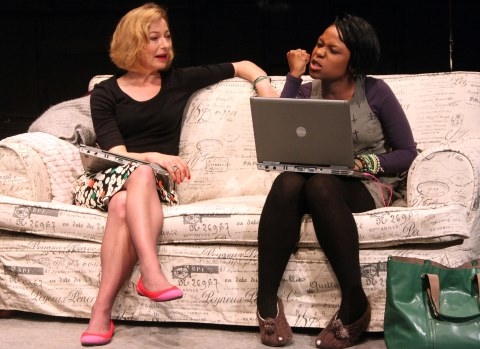Rainbow Scars (Tour – Manchester)
Joanna Ing finds that ”Rainbow Scars”sheds light on a topic rarely dealt with on stage.

Early on in Rainbow Scars the bright vivacious Lindiwe (Kertrice Maitisa) dismisses a comment of her mother’s about the period of apartheid as ‘history’.
It is a comment that sets the scene immediately. It is 2014 and Lindiwe at age eighteen is a ‘born free’. She is taking matriculation at school and is generally a typical teenager, playing loud music while doing her homework.
Ellen Robinson and her husband adopted her when she was three and she lives in suburbia far from the township where her biological family live. With her adopted father now in prison and her adopted sister in Amsterdam, Lindiwe and her mum Ellen (Jennifer Steyn) live together, mocking each other in a way only people who truly love each other do. But this comfortable existence is shattered when Lindiwe’s cousin Sicelo appears.
Sicelo (Mbulelo Grootboom) has not had all the opportunities of his cousin. Instead he has been in prison, is jobless and his little hope for the future. He is angry, but more than that he is frustrated by his cousin’s complete lack of identification with him.
Writer Mike van Graan does a good job at raising many of the issues of the modern day South Africa and the hypocrisies that sometimes emerge. For Ellen, her biological daughter Megan would have got into the University of Cape Town if she had been black, yet she has no qualms about encouraging Lindiwe to use her ‘blackness’ in her own university application form. Her character wants to be seen supporting the ‘Rainbow Nation’, but in reality only does when it benefits her.
While the relationship between Ellen and Lindiwe is clearly shown, we don’t get much of a chance to get to know Sicelo and he is a difficult character to sympathise with. Perhaps this is intentional, but it leaves the play feeling a little one-sided. There are strong performances from all three actors and some very emotive moments, but there is a sense that were the play longer, the issues could be explored in more depth.
The South Africa presented to Western audiences is often focused on Mandela or the period of apartheid so it is refreshing to see a different take set in the present day.
Rainbow Scars may only scratch the surface, but for may people it is a fresh surface.
Rainbow Scars is currently on tour.












